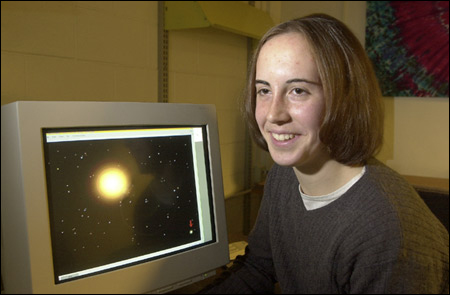Cody awarded Captain Fay Prize
Radcliffe Institute honors Ann Marie Cody’s outstanding scholarship

Harvard University graduate Ann Marie Cody, an astronomy and astrophysics concentrator, is the winner of the 2004 Captain Jonathan Fay Prize, which is awarded by the Radcliffe Institute for Advanced Study. Radcliffe Institute Dean Drew Gilpin Faust made the announcement at Radcliffe’s annual Strawberry Tea on Wednesday (June 2).
The Fay Prize honors Harvard students who have produced the most outstanding imaginative work or piece of undergraduate research in any field, which can take the form of a thesis, class research, or creative arts project. Candidates for the Fay Prize are chosen from among the nominees for Harvard College’s Thomas T. Hoopes Prize, awarded annually for outstanding scholarly work or research.
“The Radcliffe Institute is privileged to honor this extraordinary young scientist, whose pioneering work represents the first theoretical study of the phenomenon of stellar pollution by planets,” said Faust. “We look forward to watching her emerge in the coming years as a leader in the field of astrophysics.”
Cody is a member of the Class of 2003 but was eligible in 2004 for the Hoopes and Fay prizes due to the Department of Astronomy’s academic calendar. In addition to earning her the Hoopes Prize and the Fay Prize, the thesis garnered her the astronomy department’s Leo Goldberg Prize for best senior thesis last year. Cody’s winning thesis, “Polluted Stellar Evolution: Modeling the Effects of Planet Accretion,” explores the theory that a planet with an unstable orbit could migrate inward, falling into its star’s atmosphere and thereby polluting it. The paper is among the few theoretical studies of the phenomenon, and it has received attention and praise worldwide, and sparked the writing of two papers to professional journals; one of these has already been accepted for publication.
Cody embarked on her academic career at an early age. Professor of Astronomy Dimitar Sasselov, who is affiliated with the Harvard-Smithsonian Center for Astrophysics and was her nominator for the Hoopes Prize, has worked with Cody since her senior year in high school as part of the Harvard College Research Program. Sasselov calls Cody “one of the pioneers” of stellar evolution theory and planet formation theory and says he expects she will “achieve spectacular scientific results and become in due time one of the leaders in astrophysics.” In 2001, when Cody was a sophomore, the Harvard Gazette published a story about her work titled “The sky’s not the limit for this undergrad.” Since then, she has held summer astronomy studentships at the University of Hawaii Institute for Astronomy, the Netherlands Foundation for Research in Astronomy, and the Anglo-Australian Observatory in Sydney, Australia. All of this research has resulted in two published papers – with two more currently in the publication process, five conference presentations, and a number of scientific talks in Australia and Europe.
A native of Harvard, Mass., Cody is currently completing an M.Phil. degree in astrophysics at Cambridge University, where she is one of 11 scholars who is supported by a Winston Churchill Scholarship. Her present research, an extension of her undergraduate thesis topic, involves calculating how stellar oscillations are affected by planetary debris falling into the star’s outer envelope. She will continue to further her research and academic studies in the fall, when she enters the astronomy Ph.D. program at the California Institute of Technology.




